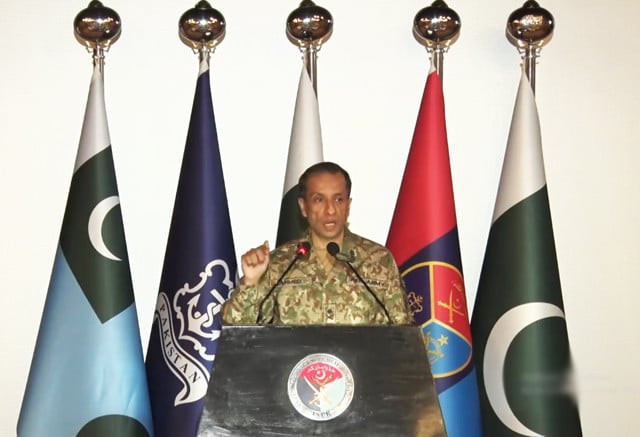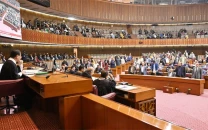Military quashes ‘baseless hearsay’ about martial law
ISPR says army united under command of COAS

The Inter-Services Public Relations (ISPR) Director General Maj-Gen Ahmed Sharif Chaudhry refuted on Friday the rumours of imposition of martial law in the country, as mere “baseless hearsay”.
Talking to a private TV channel, the military spokesperson also rejected the rumours that several officers had resigned. He assured that the army was united under the leadership of Chief of Army Staff (COAS) Gen Asim Munir.
“There is no question of martial law,” Maj-Gen Chaudhry said. Army chief Gen Asim Munir and senior military leadership “wholeheartedly support democracy and will continue to do so,” he added.
The ISPR director general emphasised that “the army was, is and will remain united” under the leadership of Gen Munir despite the internal and external propaganda. “The dream of dividing it will remain a dream,” he said.
Maj-Gen Chaudhry categorically stated that no one in the army had resigned nor had any orders been defied. He reiterated that the army chief and the entire military leadership believed in democracy.
The army spokesperson’s statement has come at a time when the country is facing extreme polarisation coupled with political, economic and constitutional crises.
Meanwhile, amid speculations about martial law, talks of imposing a state of emergency have once again resurfaced, causing concerns among different sections of society that the government may be considering the option in order to gain control of the situation.
However, before the speculation could go any further, Federal Minister for Information Marriyum Aurangzeb rebutted the news regarding emergency. “The reports circulating in the media regarding the imposition of emergency in the country are baseless,” she said.
“No such decision was taken in the federal cabinet meeting,” the minister said in a statement. She urged the media to verify the facts before airing or publishing any news.
Despite the rebuttal, however, some observers pointed out that the information minister had only stated that “no decision regarding the imposition of emergency was taken in the cabinet meeting” but she did not rule out if the cabinet actually discussed the matter.
Read Info minister refutes news reports about imposition of emergency
Later on, sources revealed that the cabinet, in fact, did discuss the option of emergency but several cabinet members opposed the idea. The ministers also opposed the idea of suspending mobile data service after the protestors took to the streets on May 9.
The discussion about the emergency is in line with the statements of several government ministers, who had stated that the option could be considered keeping in view the internal situation, as the army had to be called in to aid the civil administration the other day.
The army was called in to help the local administration and police in maintaining law and order in Punjab, Khyber Pakhtunkhwa and Islamabad, where protestors had attacked, ransacked and torched several government buildings after the arrest of Imran Khan.
Political observers said that article 232 of the Constitution allowed the president to declare state of emergency in case the country was threatened by war or external aggression, or by internal disturbance beyond the power of a provincial government to control.
They said that Article 232 (proclamation of emergency on account of war, internal disturbance, etc.) deals with governor’s rule but fulfilling its condition were not an easy task.
Article 232(1) states: “If the President is satisfied that a grave emergency exists in which the security of Pakistan, or any part thereof, is threatened by war or external aggression, or by internal disturbance beyond the power of a Provincial Government to control, he may issue a Proclamation of Emergency.”
It adds: “Provided that for imposition of emergency due to internal disturbances beyond the powers of a Provincial Government to control, a resolution from the Provincial Assembly of that Province shall be required.”
It continues: “Provided further that if the President acts on his own, the Proclamation of Emergency shall be placed before both Houses of Majlis-e-Shoora (Parliament) for approval by each House within ten days.”
Though the army and the government spokespersons have refuted the speculations about imposition of martial law or the emergency, the situation remained tense in the country. The last time Pakistan was under a state of emergency was in 2007, during the tenure of former military dictator Pervez Musharraf.
From November 3 to December 15, the Constitution remained suspended and several judges, including the then chief justice of Pakistan Iftikhar Mohammad Chaudhry were detained.



















COMMENTS
Comments are moderated and generally will be posted if they are on-topic and not abusive.
For more information, please see our Comments FAQ